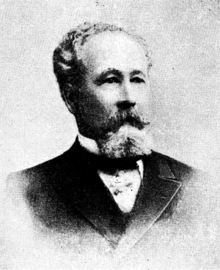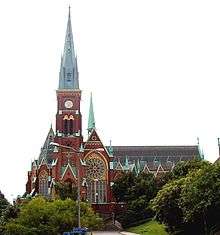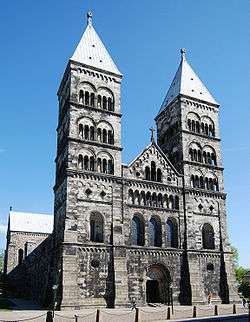Helgo Zettervall
Helgo Nikolaus Zettervall, older spelling Zetterwall, (21 November 1831 – 17 March 1907) was a Swedish architect and professor of the Royal Swedish Academy of Arts.[1][2] He is best known for his drastic restorations of churches and other buildings around Sweden. [2] [1]


Zettervall was a proponent of Gothic Revival architecture and is most commonly associated with his design of the plans for the extensive restoration of Lund Cathedral during the late 19th century.[3] [4]
Biography

Zettervall was born at Lidköping in Västra Götaland County, Sweden. He attended the Royal Swedish Academy of Fine Arts where he studied under Fredrik Wilhelm Scholander (1816–1881) and graduated during 1860. In 1862, he conducted a study trip to 1862 made a trip to Germany, France and Italy. [5] [6]
He was chief of Board superintendent for the administration of state buildings (Överintendentsämbetet) from 1882–97. Zettervall was the chief architect in the restoration of old buildings and churches in Sweden during the period 1860–90. Among other commissions, Zettervall designed the plans for the renovation of Lund Cathedral (1860–1902) and Uppsala Cathedral (1886–1893). He was appointed to several other large scale restorations including Linköping Cathedral (1877–86), Skara Cathedral (1886–94) and Uppsala Cathedral (1885–93), as well as the Kalmar Castle (1886–90).
Oscar Fredrik Church (Oscar Fredriks kyrka) in Gothenburg was constructed on the basis of plans drawn by Helgo Zetterwall. The church was inaugurated on 2 April 1893 and is a prime example of Northern European Gothic Revival architecture. Zettervall was the main proponent of Gothic Revival architecture of church buildings. His influence has been criticized for his restoration principles. His restorations were often not intended to bring back old looks, but according to Zettervall to restore them according to the ideals in the style they were originally built in.[7]
Personal life
In 1861, he married Ida Anna Christina Lagergren. He was father to architect Folke Zettervall (1862–1955). He became an honorary member of the Royal Swedish Academy of Letters, History and Antiquities in 1884 and in 1897 was made a member of the Royal Swedish Academy of Sciences. He died in Stockholm during 1907 and was buried in the family plot at Norra begravningsplatsen [8] [9]
References
- Åman, Anders. "Helgo Zettervall". Nationalencyklopedin (in Swedish). Retrieved 31 August 2010.
- "Zettervall, Helgo Nikolaus". Nordisk Familjebok (in Swedish). 33 (2 ed.). 1922. pp. 749–752. Retrieved 31 August 2010.
- "Helgo Zettervall (1831-11-21—1907-03-17)". webarkdok. Archived from the original on November 28, 2012. Retrieved January 1, 2019.
- Joakim Stierna (September 9, 2016). "Helgo Zettervall en 1800-talsmästare". Skånska Dagbladet. Retrieved January 1, 2019.
- "Helgo Nikolaus Zettervall, arkitekt". Svenskt biografiskt handlexikon. Retrieved January 1, 2019.
- Bo Grandien. "Fredrik Wilhelm Scholander". Svenskt biografiskt lexikon. Retrieved January 1, 2019.
- "Oscar Fredriks kyrka". svenskakyrkan.se. Retrieved January 1, 2019.
- "Folke Zettervall". Uppslagsverk Encyklopedi. Retrieved January 1, 2019.
- "Norra begravningsplatsen". stockholm.se. Retrieved January 1, 2019.
| Wikimedia Commons has media related to Helgo Zettervall. |
Other sources
- Bodin, Anders (2016) Zettervall i Lund : arkitektur och stadsbyggnad i 1800-talet (Lund: Föreningen Gamla Lund)